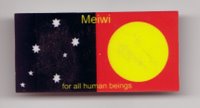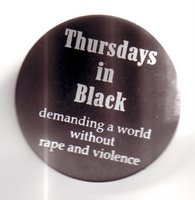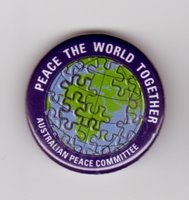 It worries me, how in this first decade of the twenty-first century we have all become wheeler dealers. Everything we do must be paid for. Schemes for obtaining customer loyalty through customer rewards have skyrocketed in availability and popularity.
It worries me, how in this first decade of the twenty-first century we have all become wheeler dealers. Everything we do must be paid for. Schemes for obtaining customer loyalty through customer rewards have skyrocketed in availability and popularity. I am not immune. And while I enjoy getting $5 off my sixth purchase of chicken products after spending $12 or more during the previous five purchases, AND modify my spending habits to enable this ‘reward’, I sense a frenetic quality, an almost desperation in myself for taking advantage in this way. It’s a symptom of a deeper societal malaise. We’ve all been tainted.
Last week, I was treated to a scrumptious lunch of rice, chickpeas and vegetables, made to a modified recipe by the class I’ve been teaching for the last five weeks. They served it to me lovingly, on an oval plate, with a large spoonful of each version of the dish as prepared by each of the three groups who were working together in the Home Economics kitchen. On one side of the plate was a generous serving of yoghurt.
When my mentor teacher and I were invited to eat lunch with our students in the Home Economics room, teachers of other classes joked with us that “there’s no such thing as a free lunch”. This reminded me of my favourite Heinlein book, The Moon is a Harsh Mistress (1966).
 I like the radical quality of some of Heinlein’s works despite the sexual decadence of some of them, which sits uncomfortably and feels so dated in this post-70s era. Heinlein never managed to circumvent his exploitation of women within his writing, despite his exploration of various scientific, social and political ideas. In The Moon is a Harsh Mistress, Heinlein posits radical new family structures, a sentient computer and a revolutionary politics which I find refreshing and inspiring. A recurring theme in this book is ‘There Ain’t No Such Thing As A Free Lunch’ (Chapter 11, p. 122 in my 1979 New English library edition).
I like the radical quality of some of Heinlein’s works despite the sexual decadence of some of them, which sits uncomfortably and feels so dated in this post-70s era. Heinlein never managed to circumvent his exploitation of women within his writing, despite his exploration of various scientific, social and political ideas. In The Moon is a Harsh Mistress, Heinlein posits radical new family structures, a sentient computer and a revolutionary politics which I find refreshing and inspiring. A recurring theme in this book is ‘There Ain’t No Such Thing As A Free Lunch’ (Chapter 11, p. 122 in my 1979 New English library edition). I wonder ...
This has been a week in which social and political activism has been uppermost in my mind. I’ve been working with a group of teenage refugees to Australia from Afghanistan, Ethiopia, Sierra Leone, Kurdistan, Liberia, Sudan and Somalia. They have been studying Australian Government, and haven’t enjoyed this much at all. I challenged myself to find a way to engage them in this topic.
 Along with Aboriginal people, refugees are some of the most disenfranchised residents of Australia. These young people all have aspirations towards the citizenship that will grant them a permanent and safe place to live out their lives. Like most teenagers, they are also bursting with energy, ideas, experiences and opinions. They want to do their own thing, without bending to the arbitrary demands of adults. During their short time in Australia, (less than two years) they have all, without exception, experienced the sting of racism. This has disillusioned them and distanced them from the joyful hopes and dreams they brought with them to this country.
Along with Aboriginal people, refugees are some of the most disenfranchised residents of Australia. These young people all have aspirations towards the citizenship that will grant them a permanent and safe place to live out their lives. Like most teenagers, they are also bursting with energy, ideas, experiences and opinions. They want to do their own thing, without bending to the arbitrary demands of adults. During their short time in Australia, (less than two years) they have all, without exception, experienced the sting of racism. This has disillusioned them and distanced them from the joyful hopes and dreams they brought with them to this country.  Having come from places where government actively seeks to make life chaotic, cruel and dangerous for its people, abstract classroom discussions of democracy and the history of Australia’s political system were hardly likely to engage them. Yet in a short time, having attained both adult status and the prize of Australian citizenship, they will all be expected to vote.
Having come from places where government actively seeks to make life chaotic, cruel and dangerous for its people, abstract classroom discussions of democracy and the history of Australia’s political system were hardly likely to engage them. Yet in a short time, having attained both adult status and the prize of Australian citizenship, they will all be expected to vote. I thought about my political activism over the years, and wondered about this idea of democracy. Certainly, I have not taken for granted, my right to protest and to lobby government for what I believe in. Since AIDEX 1991*, I don’t attend any protests without the fear of police brutality and media misrepresentation. My Jewish heritage lingers in the worry I feel at large public gatherings, that our united presence offers ideal opportunities to eliminate voices of dissent. As a novice teacher I know that my police record, if not my ASIO file, will be open to scrutiny.
 A few things reminded me of AIDEX this week. It chills me, the way South Australia’s Labor government has been crowing about our position as Australia’s “defence state”. Since the Federal Government decided to move AIDEX offshore, after the protests in 1991, I have not kept in touch with its activities and aspirations to gain more and more contracts to produce weapons and all the other paraphernalia to do with the machinery of war. Contracts to build military equipment are said to be flowing hard and fast.
A few things reminded me of AIDEX this week. It chills me, the way South Australia’s Labor government has been crowing about our position as Australia’s “defence state”. Since the Federal Government decided to move AIDEX offshore, after the protests in 1991, I have not kept in touch with its activities and aspirations to gain more and more contracts to produce weapons and all the other paraphernalia to do with the machinery of war. Contracts to build military equipment are said to be flowing hard and fast. Secondly, the so-called debate about nuclear energy has gripped Australia’s media this week. To say that nuclear power is environmentally-friendly is an oxymoron that stunned me almost speechless. Yet the Federal Government has such tight control over Australia’s media, that the other side of the debate has remained almost silenced in the mainstream media. This is terrifying, particularly given the headline on yesterday’s newspaper in Adelaide, where Alexander Downer claims a strong case for the first nuclear reactor to be built in Adelaide (front page, The Advertiser, 2 June 2006).
 Thirdly, the recurrent rise of violent unrest in East Timor and the sending of Australian peacekeepers reminded me of the paradox of maintaining and promoting a defence force for our nation that spends most of its energy in assisting other countries to attain peace.
Thirdly, the recurrent rise of violent unrest in East Timor and the sending of Australian peacekeepers reminded me of the paradox of maintaining and promoting a defence force for our nation that spends most of its energy in assisting other countries to attain peace. Sad as it may seem, Matt Groening and The Simpsons have done a brilliant job of desensitising Australia’s young people to the issue of nuclear energy. If the Simpsons can dwell in tranquil unconcern about the nuclear reactor in their back yard, and even laugh about their father’s ineptitude in his job to maintain the safety of the reactor, then what are all these old fogey hippies yelling about, when they say that nuclear energy is dangerous and unnecessary? There’s no issue, is there?
 Sadly, the twists and cynicism of the Simpsons go straight over the heads of Australia’s apolitical youth. They may be taught in school to critically analyse texts until they are blue in the face, but the fact of the matter is that applying this critical analysis to situations in their own lives is never encouraged. For teacher in schools, just like workers in women’s health centres and those behind the desks of the public service, the exploration of issues is tightly controlled. We impose silence over our opinions to protect ourselves. No one wants to risk losing their job or jeopardising the existence of public services by saying things that the government doesn’t want us to say.
Sadly, the twists and cynicism of the Simpsons go straight over the heads of Australia’s apolitical youth. They may be taught in school to critically analyse texts until they are blue in the face, but the fact of the matter is that applying this critical analysis to situations in their own lives is never encouraged. For teacher in schools, just like workers in women’s health centres and those behind the desks of the public service, the exploration of issues is tightly controlled. We impose silence over our opinions to protect ourselves. No one wants to risk losing their job or jeopardising the existence of public services by saying things that the government doesn’t want us to say. (Doesn’t sound much like democracy to me, but there you go!)
 Homer and Bart, like Howard and Costello, Rann and Foley, are still our larrikin heroes. Lisa and Marge, like Bob, Sandra and Natasha, are everybody’s mothers who exist only to spoil the boys’ fun. Needless to say, we all want to be one of the boys!
Homer and Bart, like Howard and Costello, Rann and Foley, are still our larrikin heroes. Lisa and Marge, like Bob, Sandra and Natasha, are everybody’s mothers who exist only to spoil the boys’ fun. Needless to say, we all want to be one of the boys! For my class, I wrote a short description of the arrestable protest action I undertook, with six other young people, at AIDEX 1989. We read this as a class, and began to discuss whether our action had achieved anything. The point of the exercise was to instil in these young people, the idea that dissent is a natural and inevitable part of every democracy.
Complacency is the result of disenfranchisement.
 The second step was to analyse authentic letters to the editor. I put them in groups of three, each with a different letter. The topics ranged from nuclear energy, Sydney’s riots last year, working women to Australia’s anti-terrorism legislation. These were tough issues for the refugee students to comprehend, let alone work with.
The second step was to analyse authentic letters to the editor. I put them in groups of three, each with a different letter. The topics ranged from nuclear energy, Sydney’s riots last year, working women to Australia’s anti-terrorism legislation. These were tough issues for the refugee students to comprehend, let alone work with. By the end of the week, students wrote ‘letters to the editor’ about issues they feel strongly about. To set the scene, I had first of all to explain the role of an editor in newspapers, and the right of residents to write letters to media and politicians on the assumption that these letters receive attention and even be published. My aim was to given the students the idea that as new Australians, they can and should contribute to our society.
 Not surprisingly, a couple of them chose to write about the racist attacks they have experienced on Adelaide’s public transport. Others wrote about issues to do with driving – petrol prices, drink driving, and using a mobile phone whilst driving. These are all issues with which these young people are engaged. I felt encouraged by their willingness to accept the idea that they have a voice in determining aspects of the society in which they live.
Not surprisingly, a couple of them chose to write about the racist attacks they have experienced on Adelaide’s public transport. Others wrote about issues to do with driving – petrol prices, drink driving, and using a mobile phone whilst driving. These are all issues with which these young people are engaged. I felt encouraged by their willingness to accept the idea that they have a voice in determining aspects of the society in which they live. As far as the free lunch goes, I could be cynical and say it was offered to me in thanks for caring enough about them to give them access to voicing their concerns and their ideas in this world. I’ll leave it to my readers to determine my motivation – was it altruism, or purely self-interest?
*AIDEX (Australian International Defence Equipment Exhibition) was first held in Canberra in 1989. Planned to occur every two years, protest action against the arms exhibition grew exponentially between 1989 and 1991 to such an extent that the exhibition was subsequently moved offshore. Protests which had aimed to be peaceful and creative, were marked by police brutality towards protesters who were mostly white and middle class, and had never been exposed to the reality of such violence. For more archived information about AIDEX and its legal aftermath, see: http://www.greenleft.org.au/back/1992/42/42p2b.htm “Aidex aftermath”, published in Green Left Weekly, http://www.cat.org.au/catv/catv95/Aidex.html “AIDEX ’91 Inside the Arms Trade”, http://www.jcs.act.gov.au/eLibrary/lrc/r15/r15a.html Attachment A, Attorney General’s Office, http://www.jcs.act.gov.au/eLibrary/lrc/r12/r12_fn.html , http://nla.gov.au/nla.cs-pa-http%253A%252F%252Fbuffy.lib.unimelb.edu.au%252Fcgi-bin%252Fmua-search%253Ftdetails%253D936%253Bimgdetails%253D936 “Picture Australia – Police and protestors clash at the Australian International Defence Equipment Exhibition (AIDEX) protest, Canberra, 26 November 1991”, http://users.senet.com.au/~gregogle/Free%20Speech%20Speech.htm “Protest and the Law. An Anarchist Speech at South Australia’s Law Week Speaker’s Corner”, (16 May 2002), http://www.spunk.org/texts/tech/sp001035.txt “Surveillance”, (Dimity)
3 comments:
about 'Remembering AIDEX'
I was watching the news earlier and saw people talking about nuclear plants in SA as if it is a given. I hate watching the news. i don't know why i still do it.
I have a real bug bear about landmines. WHat sort of a mind thinks up a land mine that looks like a bright toy, just so kids will touch it? I become afraid when i think about stuff like that too much.
As far as racism goes, pretty much everyone i know is a racist - my chinese friends hate vietnamese people, my italian friends despise greeks - i gave up trying to work that out. It did my head in. I don't give a shit where someone is from, or not from & if i ever catch myself making generalisations i have to pull myself up in it.
sorry about my little rant there...i am in a reflective mood tonight...it is one of those nights. (Lizzy)
May I pass this on? (Aviva)
well done on being so active in your objections. There's sinister stuff going on with Howard and the nuclear industry now - which will give big contracts to American companies to build plants here. Maintain the rage! (Mary-Anne)
Post a Comment